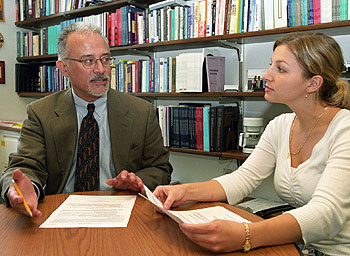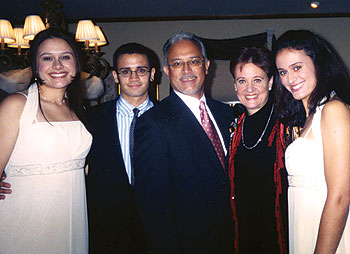The U.S. Census Bureau projects that in the year 2020, nearly one-fifth of the population will be Hispanic. That prediction, says Luis H. Zayas, Ph.D., presents daunting challenges to our nation.
But it’s the everyday life of families, and the underlying culture that shapes it, that has captured Zayas’ imagination and fueled his life’s work.

Photo by David Kilper
Luis Zayas confers with Allyson Pilat, project assistant at the Center for Latino Family Research. “Professor Zayas has provided outstanding leadership in all aspects of the school’s mission: he is an internationally recognized scholar, an award-winning teacher and, in his role as associate dean of faculty, an important administrative leader,” says Edward F. Lawlor, Ph.D., dean and the William E. Gordon Professor of Social Work.
Zayas, the Shanti K. Khinduka Distinguished Professor of Social Work and associate dean of faculty, focuses on pressing social problems in Hispanic populations. A study on the rising rate of Latina suicides and research on the treatment of pregnant minority women suffering from depression and stress are just two of his many projects under way.
He’s helping to build a new research center for Hispanic studies at the George Warren Brown School of Social Work. And earlier this month, he launched a series of conferences, drawing leading Hispanic scholars to the WUSTL campus.
His research on Latina youth at risk has prompted a steady stream of interviews with the likes of National Public Radio, Tiempos del Mundo, The New York Times and People en Español. As a result, Zayas has received e-mails and letters from troubled youth and worried parents eager to connect with someone who understands their plight.
Zayas answers them all. Throughout his 30 years of clinical practice and scholarship, he has been guided by one very powerful idea: improving the lives of Latino families.
A psycho-social approach
“I’m a cultural psychologist by nature and profession,” Zayas says, who holds a joint appointment in psychiatry at the School of Medicine. “What intrigues me most is how culture influences behavior.
“Most people don’t often think about culture, although we live and breathe it every day,” he adds. “It’s only when we find ourselves in a different context or culture do we think about it in any depth.”
To better understand the behavior in families, Zayas draws on his expertise in psychology, social work and anthropology — a rich blend that he describes as “the beauty of his approach.”
His early clinical training focused on people “who represented all continents on any given day,” he says.
“I quickly realized that I couldn’t apply one universal approach to either diagnosis or assessment or treatment,” Zayas recalls. “I had to adapt each approach to the person or family I was working with so that one could understand what it meant to be a member of that group.”
Zayas has worked as a practitioner in child and adolescent psychiatry clinics, primary care community health centers and pediatric physical rehabilitation settings in New York, home for most of his adult life.
He also received his education there: doctoral and master’s degrees in developmental psychology, a master’s in philosophy and a third master’s in social work, all from Columbia University.
He has served on the faculty of family medicine at Albert Einstein College of Medicine in the Bronx, N.Y., and as a clinician in the college’s teaching hospital, Montefiore Medical Center.
Teaching, research
The mix of teaching and research suited Zayas perfectly. He logged seven years on the Fordham University faculty before joining WUSTL in 2002. For the last three of those years, he also directed the work of Fordham’s Center for Hispanic Mental Health Research.

Courtesy Photo
(From left) Amanda, Luis-Michael, Luis, Stephanie and Marissa Zayas.
His clinical practice has cut across generations. At Montefiore, he treated the children of parents who died of AIDS. Then, he joined with the New York City Council on Adoptable Children to ensure a smooth transition for these orphans into kin and non-kin families. For this work, he was honored with the Cultural and Economic Diversity Award from the American Family Therapy Academy in 1993.
He’s researched parenting, too — how values are transmitted to youngsters and the role culture plays in the process.
At Fordham, Zayas studied depression in Latina children. Particularly alarming, he recalls, were statistics just issued by the Centers for Disease Control and Prevention.
“In the mid- to late-1990s, reports on Latinas revealed that they were twice as likely to attempt suicide as white and African-American teens,” he says.
Why is this group at risk? Zayas and his research team are two years into a five-year study that they hope will provide answers.
“We know that the adolescent’s struggle for identity often clashes with her deep regard for family, its traditions and beliefs,” Zayas says. “We want to know what it is at that moment, when they ingest the pills or cut themselves with glass, that causes them to take action. Until we understand the cultural conflict, we will not be able to prevent this.”
Given the nature of Zayas’ work, it is no wonder that he comes across as a warm and fully engaged communicator. He is polished, personable and unabashedly passionate about his work and sharing it with others.
These qualities are not lost on his students.
“I highly value Professor Zayas’ work with ethnic communities and the unique perspective he brings to his research and teaching,” says doctoral student Stavroula Kyriakakis, who recently presented data on the Latina suicide project at a conference in Santiago, Chile. “He is very well networked and has provided me with great opportunities in both research and professional development.
“He’s a New Yorker, like me,” she adds, “and was responsible for bringing me into the program. I thought St. Louis was a long way from home. He kept telling me, ‘You’re just a flight away.'”
Path to helping profession
The question of what makes families tick occurred to Zayas at an early age. Born in Coamo, Puerto Rico, to parents reared in rural poverty, he and his family traveled extensively, courtesy of the U.S. Army.
“You had to make friends fast because you knew you would soon be moving on, not likely to see them again,” Zayas says, conjuring up memories of homes in Richmond, Va.; Fort Devens, Mass.; Watertown, N.Y.; and Munich, Germany.
“In some cases, we were the only Hispanic family, or one of a few Hispanic families in the neighborhood, and we faced discrimination and prejudice.”
|
Luis H. Zayas “Family is key to my life and my work.” Luis H. Zayas Wife: Stephanie, a special education teacher Children: Marissa, 24, works for a corporation in New York; Amanda, 22, a recent Fordham grad looking to ply her talent in fashion design and art; Luis-Michael, 19, a WUSTL sophomore and jazz musician Hobbies: listening to jazz, visiting museums and galleries, playing with acrylics on canvas |
Despite the odds, the Zayas family pulled together and prevailed.
“Our tight-knitted relationship and the way we managed the stress of moving a lot had a great impact on me,” Zayas says. “I saw what a strong family can do in helping one another adapt and adjust. These experiences are what brought me to a helping profession.”
It has been the female members of his family, Zayas says, who have influenced his research the most, this borne out by his strong focus on women’s health and related issues.
“My father was away a lot of the time, so for the first 11 years of my life, it was mainly my mother and my sisters,” Zayas says. “We are all extremely close to this day.”
Hispanics in the heartland
“Despite increasing scholarship on Hispanics in the United States, we still don’t know enough about their health needs and the social and economic development of their families and communities,” Zayas pointed out.
But he is about to change all that.
Under Zayas’ direction, the Center for Latino Family Research will produce family oriented research and develop young scholars committed to advancing knowledge on Latino populations.
“What is unique about Professor Zayas’ concept,” says Edward F. Lawlor, Ph.D., dean and the William E. Gordon Professor of Social Work, “is the way in which the center stands to influence scholarship and service delivery at all levels: locally, nationally and internationally. I am particularly excited about the potential exchange it will build for Washington University in Central and South America.”
“The effects of globalization have never been more evident,” Zayas says. “A research center devoted to Latino families must be Pan-American in scope — the ties that bind are deep. What affects one country affects its neighbors.”
In Zayas’ mind, there’s no better place than WUSTL to build such a center.
“The University is unique in that it has both the resources and the determination to make a successful enterprise stick and endure,” he said. “I’ve seen that when something really good happens here, the University throws itself behind it to ensure its success.”